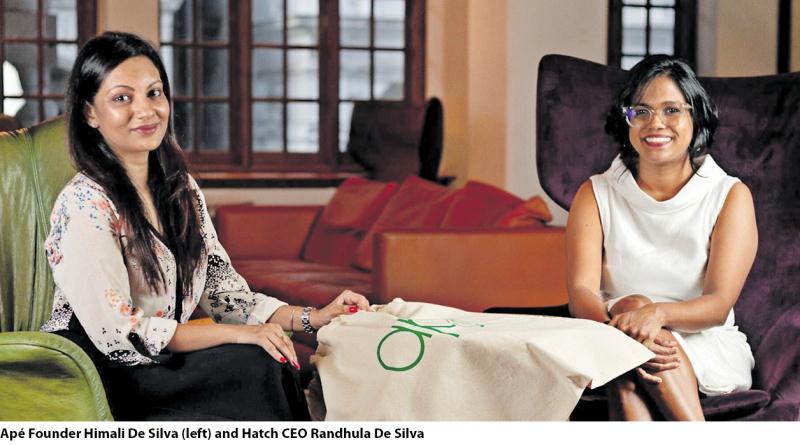 By Uwin Lugoda
By Uwin Lugoda
Last year, the world threw away around 300 million tonnes of plastic, which is near-equivalent to the weight of the global human population. Sri Lanka was named as one of the largest contributors; the country was ranked among the top five marine plastic polluters of the world by Earth Day, with a mismanaged plastic waste of 1.59 million metric tonnes per year.
While plastic is one of the main contributors to waste, the real culprit is the traditional linear manner we consume products. This linear consumption is where we take, make, consume, and throw away, creating more unnecessary waste.
This has led the world to start moving towards circular consumption, where items are handled in a more conscious and responsible manner, keeping them in circulation for as long as possible by reusing, sharing, and thus reducing waste. However, as products alone are not circular, it’s the choices consumers make post purchase.
In order to introduce this type of thinking, the local start-up Apé is set to raise awareness and enable circular consumption by providing a resale platform for pre-loved high-quality items.
According to Apé Founder Himali De Silva, numerous high-quality items tend to be durable and have a high shelf life; therefore, once a consumer is done with the item, it can still be used by someone else. She explained that the advantage of partaking in circular consumption is that one would be able to earn some extra money from an item that would have otherwise been thrown away. Similarly, by buying pre-loved items, one could purchase them potentially at a much lower cost and thereby save.
“This reduces wastage overall, whilst enabling more people to get the chance to enjoy a good-quality product that they may have always wanted but could not afford at the original price. Hence, partaking in circular consumption patterns ensures that products are handled in a responsible and conscious manner by keeping them in circulation for as long as possible.”
De Silva first launched the start-up in 2017 under the brand 10/10 Collaborative Consumption, which was successful. After a brief pause following this, she stated that she rebranded and redesigned the model and re-launched it as Apé in May 2020.
She stated that pre-loved shopping is extremely popular abroad. However, she consciously built Apé’s business model to match certain aspects of the local culture, such as the country’s different socioeconomic market tiers and charitable nature. For example, she explained that Apé ensures the anonymity of both the seller and buyer as there is still a stigma associated with the second-hand market.
In addition, the start-up does not take away items that could or would normally be donated to the less fortunate. Thus, Apé has made the conscious decision to accept only higher quality items for listing and hold a minimum price at which the sellers can list their items.
“Higher end items may not be appropriate for donation or are better suited to be sold, and that cash could be of use to the seller during these unprecedented, hard, economical times for all of us, or the cash donated to the less fortunate which could be more helpful to them than, for example, a Rs. 4,000 dress.”
De Silva stated that as the concept of circular consumption is relatively new to Sri Lanka, there is a need to nudge the local consumer mindset towards it. She stated that she aims to overcome this challenge via raising awareness on the numerous benefits derived both personally and on a macro level via moving local consumption patterns to more circular ones.
Apé is also part of the Hatch Open House, a mentorship initiative introduced by Hatch Coworking. De Silva has taken part in the programme since June, where she has been having one-on-one mentoring sessions with the expert mentors of the Hatch mentor network before she joined the three-month mentoring programme in July. She was also a part of Series 3 of the Hatch Kickass Bootcamp, Hatch’s incubation programme to support and empower women in business.
During this mentoring session, De Silva worked directly with Hatch CEO Randhula De Silva, who had given the young start-up numerous ideas around branding, positioning, and implementation that can be used to grow the Apé brand in the short as well as long term.
“Randhula has been a source of support and believer in my vision. She is not only an advocate for sustainable, circular living, but also embodies it in her consumption choices which made her the perfect fit as a mentor for me,” said De Silva.
She stated that one of these ideas came in the form of the Apé collection bag, an innovative branding idea of having an Apé branded collection bag, akin to the laundry bags found in hotels. She stated that she implemented Randhula’s idea via getting an eco-friendly Apé branded collectors bag made, which received positive responses from the recipients, and act as a physical branding tool.
Finally, De Silva stated that she plans to evolve with the market, as it changes due to the uncertain environment the Covid-19 pandemic has created.
She went on to state that the start-up also looks at helping the local community by donating a percentage of the Apé helpers’ fee made from every sale to Amitsu, a home for abandoned children.
“It is inspiring to see the diverse types of entrepreneurs who come through to the Hatch mentorship programme, trying to solve different problems. And it is fulfilling to see how the programme helps entrepreneurs in different ways at different points of their journey. It is not only about meeting mentors with different insights, but also about knowing what works best for your company’s journey and acting upon it in turnaround time,” said Randhula.
• Popularising circular consumption in Sri Lanka

